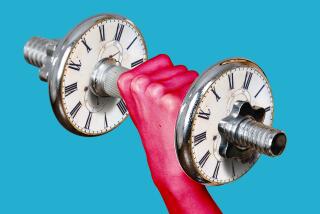Strength training does more than bulk up muscles
- Share via
Strength training has strong-armed its way beyond the realm of bodybuilding.
A growing body of research shows that working out with weights has health benefits beyond simply bulking up one’s muscles and strengthening bones. Studies are finding that more lean muscle mass may allow kidney dialysis patients to live longer, give older people better cognitive function, reduce depression, boost good cholesterol, lessen the swelling and discomfort of lymphedema after breast cancer and help lower the risk of diabetes.
“Muscle is our largest metabolically active organ, and that’s the backdrop that people usually forget,” said Kent Adams, director of the exercise physiology lab at Cal State Monterey Bay. Strengthening the muscles “has a ripple effect throughout the body on things like metabolic syndrome and obesity.”
Historically, strength training was limited to athletes, but in the last 20 years, its popularity has spread to the general public, said Jeffrey Potteiger, an exercise physiologist at Grand Valley State University in Grand Rapids, Mich., and a fellow of the American College of Sports Medicine. “One can argue that if you don’t do some resistance training through your lifespan, you’re missing out on some benefits, especially as you get older or battle weight gain,” he said.
When we hit middle age, muscle mass gradually diminishes by up to about 1% a year in a process called sarcopenia. Women also are in danger of losing bone mass as they age, especially after the onset of menopause. Some studies have shown that moderate to intense strength training not only builds skeletal muscle but increases bone density as well.
Strength training often takes a back seat to cardiovascular training, but it can benefit the heart in ways that its more popular cousin can’t.
During cardio exercise, the heart loads up with blood and pumps it out to the rest of the body: As a result, Potteiger said, “the heart gets better and more efficient at pumping.”
But during resistance training, muscles generate more force than they do during endurance exercises, and the heart is no exception, Potteiger said. During a strength workout, the heart’s muscle tissue contracts forcefully to push the blood out. Like all muscles, stress causes small tears in the muscle fibers. When the body repairs those tears, muscles grow. The result is a stronger heart, not just one that’s more efficient at pumping.
Another big advantage of working out with weights is improving glucose metabolism, which can reduce the risk of diabetes. Strength training boosts the number of proteins that take glucose out of the blood and transport it into the skeletal muscle, giving the muscles more energy and lowering overall blood-glucose levels.
“If you have uncontrolled glucose levels,” Potteiger said, “that can lead to kidney damage, damage to the circulatory system and loss of eyesight.”
The benefits don’t end there. A 2010 study in the Clinical Journal of the American Society of Nephrology suggested that people on dialysis can benefit from building muscle. Researchers found that kidney dialysis patients who had the most lean muscle mass — a measurement derived from the circumference of the mid-arm muscle — were 37% less likely to die than the patients who had the least.
“This is something that has an impact on survival,” said Dr. Kamyar Kalantar-Zadeh, a principal researcher at the Los Angeles Biomedical Research Institute and coauthor of the study. “It’s not just about having more muscle and looking better — we’re talking about life and death.”
Even people who already have chronic kidney disease could benefit from strength workouts. Germany began to incorporate modified exercise equipment into dialysis treatment centers in 1995, and a 2004 study in the American Journal of Kidney Diseases examining that policy found that exercise may improve the efficiency of dialysis by increasing blood flow through the muscle and improving phosphate removal.
The brain may get a boost from the body’s extra muscle as well. A 2010 study in Archives of Internal Medicine found that women ages 65 to 75 who did resistance training sessions once or twice a week over the course of a year improved their cognitive performance, while those who focused on balance and tone training declined slightly. One reason for the improvement, researchers believe, may be that strength training triggers the production of a protein beneficial for brain growth.
This study was triggered by another that looked at resistance training as a way to reduce the risk of falls in older people, said coauthor Teresa Liu-Ambrose, a researcher at the University of British Columbia’s Centre for Hip Health and Mobility in Vancouver. As the study progressed, she said she noticed that participants “were able to take on new tasks, like taking the bus by themselves. They were able to prepare and plan for things and execute them.”
Strength training could be easier for people with mobility problems who might find it easier to navigate a stationary weight than a moving treadmill.
“It’s never too late to start,” Adams said. “The benefits are great.”






